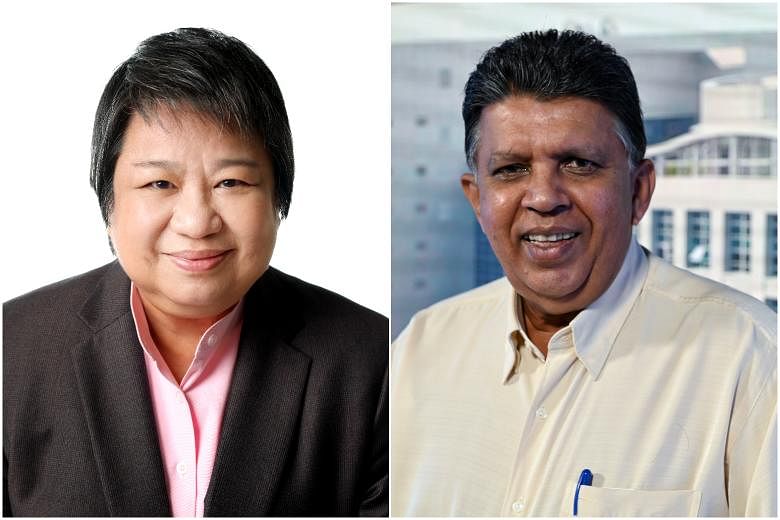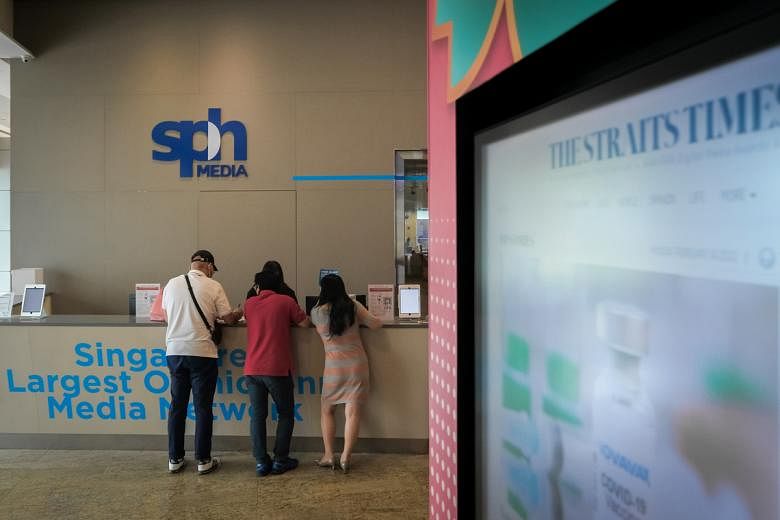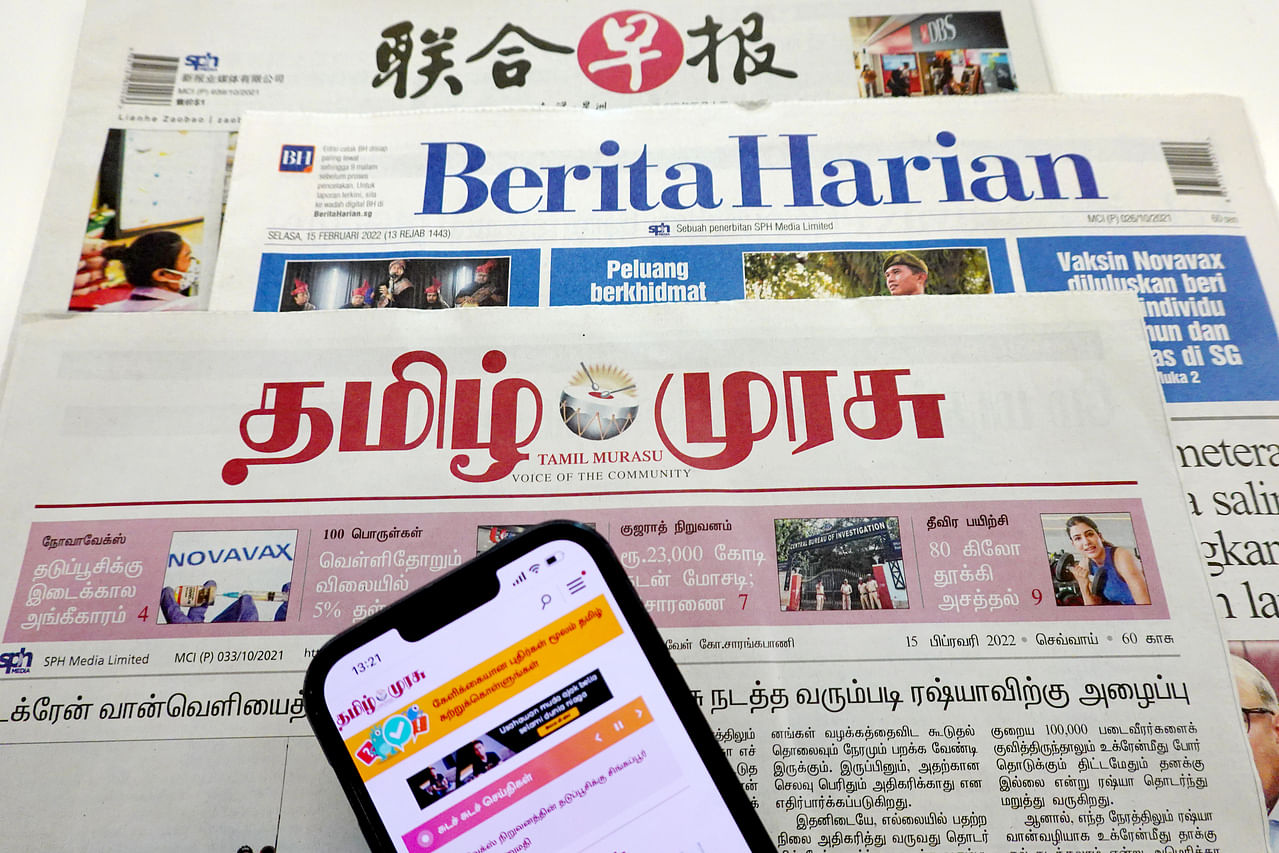SPH Media Trust to get up to $180m a year in government funding for next five years
In its initial years, SPH Media Trust is expected to spend approximately 40 per cent of government funding on technology investments and digital talent. ST PHOTO: GAVIN FOO
Goh Yan Han
Political Correspondent
Feb 15, 2022
SINGAPORE - SPH Media Trust (SMT) will get government funding of up to $180 million annually over the next five years, and the company will be required to provide half-yearly progress updates, Minister for Communications and Information Josephine Teo told Parliament on Tuesday (Feb 15).
The Ministry of Communications and Information (MCI) has set aside this funding support to provide SMT with more capital to invest in the future while ensuring it is able to sustain current operations during this critical transition period, she added. The funding quantum will also be reviewed after the first five years based on the progress that SMT has made.
SMT had spun off from mainboard-listed company Singapore Press Holdings (SPH) to
become a not-for-profit entity last December, and shared its plans with the public last month.
Mrs Teo was responding to several questions from Ms Tin Pei Ling (MacPherson) and Ms Hany Soh (Marsiling-Yew Tee GRC) on how to ensure funding support for SMT goes towards digital transformation, as well as from Mr Alex Yam (Marsiling-Yew Tee GRC) on editorial independence and Mr Sharael Taha (Pasir Ris-Punggol GRC) on the viability of vernacular media, among others.
The minister noted that Singaporeans consume varied perspectives from around the world, but "preserving local news media remains critical".
"Our local news media provides a vital Singaporean lens through which citizens can make sense of global events. It is an essential public good in our multiracial, multi-religious society," she said.
Mrs Teo said that in the initial years, the ministry expects SMT to spend approximately 40 per cent of the funding on technology investments and digital talent.
The remainder will be spent on newsroom capability building and training, in particular for the vernacular newsrooms, she said.
With such a significant amount of public funding, the MCI will monitor SMT's performance closely through key performance indicators, she added.
These will track total reach and engagement of SMT's products, with a focus on digital platforms; specific reach indicators for vernacular groups and youth; and the resilience of SMT's flagship products to minimise downtime and disruption.
Said Mrs Teo: "SMT is required to provide progress updates to MCI on a half-yearly basis. This allows MCI to track SMT's progress, and for the Government to help SMT achieve its desired outcomes when necessary."
The minister noted that readership and trust in SMT's journalism continue to be high, citing a 2021 survey that found SMT's weekly reach extends to almost 75 per cent of Singaporeans, who trust it to produce reliable news and content.
On top of the cost of producing quality content, newsrooms must also invest in reaching audiences in a crowded digital space, she added.
She cited German publisher Axel Springer, which in 2019 committed €100 million (S$152.5 million) in investments for digital growth projects at two of its papers, on top of its information technology development projects supporting its digital business model, which amounted to another €100 million.
She also cited The New York Times, which has been prioritising its digital growth and has seen its product development costs increase more than 25 per cent year on year - exceeding US$130 million (S$175 million) in 2020.
To achieve its mission, SMT must do three things, she said.
It must make long-term investments in the capability development of technology and talent, sustain and develop the vernacular news media, and position itself as a regional thought leader, she said.
Based on an MCI survey, around 65 per cent of respondents accessed SMT's digital content frequently in 2020, a steep jump from about 40 per cent the year before. In contrast, hard-copy reach declined from about 40 per cent to 30 per cent over the same period.
The digital pivot of SMT will be key to growing its reach and this includes packaging complex information in a variety of ways, such as videos, podcasts and interactive infographics, as well as having sufficiently robust infrastructure at the back end.
The new SPH Media Academy will also update newsrooms' training programmes for the digital age.
Addressing questions from Mr Sharael about the viability, relevance and growing the reach of vernacular media, Mrs Teo said that although vernacular readership is smaller and thus more challenging to independently sustain, it is critical to provide credible news products that serve Singapore's multiracial society.
She said: "If we had allowed our vernacular media to wither, Singapore would have been the poorer for it. We would have lost our souls.
"Even if they were to be unviable business propositions - which they are not - we believe it is in the public interest to do all we can."
To preserve and develop all the vernacular outlets in both SMT and Mediacorp, the government funding for SMT will go towards sustaining vernacular newsrooms, and developing new content formats like videos and podcasts, to reach younger generations, she added.
SMT will also be partnering clan associations, community groups and schools to provide students with greater access to its vernacular products, she said.
To preserve and develop all the vernacular outlets in both SMT and Mediacorp, the government funding for SMT will go towards sustaining vernacular newsrooms. ST PHOTO: GAVIN FOO
To boost its thought leadership capabilities, SMT will also expand its foreign bureaus, host more events and forums, and establish more partnerships to build an international audience.
Said Mrs Teo: "As much as the media is coming under challenge throughout the world, we must be mindful that the major powers are waging a constant battle for hearts and minds worldwide - including our hearts and minds in Singapore.
"As a small country, we are especially prone to influence campaigns - overt or covert. And as a multiracial, multilingual country, we are especially prone to the cultural, social and even political influence that countries like China and India can continue to exert abroad."
Hence, there is a need to have Singaporeans reporting on the world from the Singaporean perspective, she said.
"A Singaporean reporting on China, for example, would afford us a lens very different from an American or a European doing so. Thus, the growth of SMT's overseas bureaus is an important area of capability development we want to support."
The minister noted that the direction SMT is charting out is promising, but will require significant investments over a period of time, and said SMT will likely be loss-making during the transition.
"The Government is ready to put support behind SMT's transformation. We are committed to safeguarding the information space for our citizens," she said.
She added that government funding of news media is common in many countries, and has increased in some cases during Covid-19, underscoring the public good that trusted journalism provides in a complex environment.
In 2020, the French government introduced a subsidy package of more than €480 million to support its news media in weathering Covid-19 losses and moving to digital platforms, while Norway and Sweden rendered €43 million and €65 million of aid respectively to their press.











